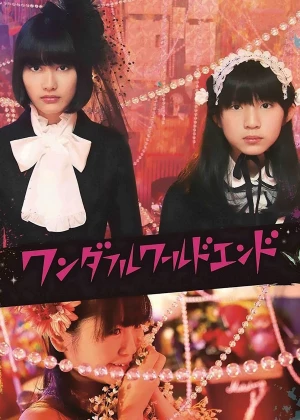Wonderful World End
Movie details

One of the nicest things about being a (completionist) cinephile is that you sometimes find little gems in the unlikeliest of places. Not that Daigo Matsui's oeuvre is a wasteland of quality, but my expectations of Wonderful World End [Wandafuru Warudo Endo] were rather limited. I certainly wasn't expecting to be wowed by it. But here we are, a good 80 minutes after starting the film I was impressed by the way it handled and presented its core themes. It's probably a film for diehard fans of Japanese cinema only, then again, chances are slim that anyone else will bump into it by accident.
![screencap of Wonderful World End [Wandafuru Warudo Endo]](/thumbs/img/articles/1200xauto/wonderful-world-end-1.webp)
Daigo Matsui has a pretty solid oeuvre, I just hadn't seen anything yet that blew me away. There are some fun comedies and nice coming-of-age dramas in there, but they all tend to stick closely to genre conventions, making it difficult for them to stand out. Wonderful World End felt different, more like Hideaki Anno's Love & Pop, a film with a similar pulse, which also mimics the vibe of its lead characters. The difference is that Matsui makes sure his feature doesn't get overly frilly and poppy while adding some stylistic polish in the process.
Wonderful World End deals with the world of Japanese idols, more specifically the lower ranks where young people are struggling to get noticed. It's not a very glamorous scene and this certainly isn't the first film that tackles the subject, but somehow this never felt quite as judgemental or diminutive as some of the others I've seen. The film throws three people together and sees how their evolving relationships steer their lives in different directions. The characters are the main focus of the film, which I felt worked very well.
Ai is a young girl who tries to make it as an idol. She dresses up as a gothic lolita for events and she has a Twitter livestream, but she struggles to attract new fans. Her boyfriend tries to make it as a theater actor, but he too finds it difficult to hold his head above water. Their lives change when a diehard fan of Ai enters their lives. She's only 13 years old, but she is smitten with Ai and mimics her every behavior. When Ai's boyfriend invites her to stay in their apartment, Ai decides it may be time to move on, but she doesn't feel good leaving her fan with her ex.
![screencap of Wonderful World End [Wandafuru Warudo Endo]](/thumbs/img/articles/1200xauto/wonderful-world-end-2.webp)
The film looks and feels very contemporary as if shot by someone who was still very much in tune with the age group of his leads (Matsui just turned 30 when shooting this film). The camera work feels intimate, the visualizations of the online conversations make sense and even though the cinematography may lack a more classic finish, there's still plenty of room for visual delight. The visual style really helps to ground the film and makes sure this doesn't feel like an outsider's perspective on youth culture. Something I appreciate a lot.
Even though the film handles the idol world, you don't need to fear an overload of J-Pop on the soundtrack. The score is very minimal, with only a select few pieces appearing throughout, and only one or two idol songs. There's also a singer/songwriter song or two, the rest is more classic Japanese drama fare, meaning string and piano tunes to establish a calming mood. It's not the most remarkable score, but it does a decent job highlighting the more dramatic moments. There was clear potential to do better, but considering the setting, it could've turned out a lot worse too.
Ai Hashimoto is one of the big contemporary Japanese actresses, though she usually appears in lighter fare. It's nice to see her take on a slightly edgier part, even though the role of an up-and-coming Lolita idol is still very much tailored to her persona. Jun Aonami is equally good, only her performance is maybe even more impressive considering her young age. The onscreen chemistry between the two is great and strengthens the dramatic side of Wonderful World End. The rest of the cast is solid too, though it's the two leads who carry most of the weight.
![screencap of Wonderful World End [Wandafuru Warudo Endo]](/thumbs/img/articles/1200xauto/wonderful-world-end-3.webp)
The first third of the film felt a little aimless, but it did an excellent job introducing the characters and the setting. The story remains a little unpredictable throughout, but the bond between the characters grows much stronger during the middle part and sets everything up for a magnificent finale. Some poignant and memorable scenes elevate this film from a fine drama into a respectable personal favorite. I'm not sure how broad the film's appeal is because of the looser narrative, but for me, it ended up being a definite plus.
Wonderful World End is one of the many Japanese dramas dealing with adolescents, but it manages to stand out thanks to its original setting, its unpredictable plot, and its youthful presentation. It offers a nice twist on the traditional Japanese drama, without turning the genre on its head. Availability is going to be a problem, and I don't see this improving in the near future, but those adamant enough will no doubt find their way to this film. It certainly helped me to grow my appreciation for Matsui's capabilities as a director.